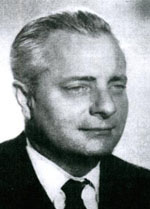Diomède Catroux
( diplomat, politician) | ||||||||||
|---|---|---|---|---|---|---|---|---|---|---|
 | ||||||||||
| Born | 1 May 1916 Paris, France | |||||||||
| Died | 8 March 2008 (Age 91) Neuilly-sur-Seine, France | |||||||||
| Nationality | French | |||||||||
| Alma mater | • lycée Janson-de-Sailly • lycée Fénélon • lycée Condorcet • Sorbonne | |||||||||
| Party | Rassemblement du peuple français, Groupe Rassemblement pour la République | |||||||||
| Relatives | Georges Catroux | |||||||||
French Gaullist diplomat and politician who attended Bilderberg/1975. War-time associate of Jean Monnet.
| ||||||||||
Diomède Catroux was a French diplomat and Gaullist politician, and war-time associate of Jean Monnet.[1] He attended the 1975 Bilderberg meeting.
Background
He was son of the art expert René-Claude Catroux, and nephew of general and politician Georges Catroux.[2]
Education
He studied law at the Sorbonne and entered the administration of foreign affairs in 1938.[2]
After having participated as an officer in the first battles of the Second World War, he then participated in the resistance within the Free French Forces. Sentenced to death in 1943 by the Vichy government, he went to Algiers where he worked with Jean Monnet. He was then sent to the United States where he participated in the preparation of the Normandy landings. His action in the resistance earned him many decorations, including the Legion of Honor and the croix de guerre.
He then held various positions in the ministerial offices, or of the provisional government: chief of Staff to his uncle, General Catroux, at the end of the year 1944, then to Christian Pineau, minister of supply, and finally advisor to André Malraux, from October 1945 to January 1946. He was member of the permanent delegation of France to the United Nations from that date.[2]
He joined the RPF from the creation of it, in 1947. Within this Gaullist party, he was in charge of press services and propaganda.
In 1951, he was elected deputy for Maine-et-Loire, second on the RPF list which obtained 36% of the votes. At the National Assembly, he intervened especially on international issues, taking advantage of his training as a diplomat.
After the dissolution of the RPF in 1955, he joined the group of Social Republicans and supported the political approach of Pierre Mendès France, who appointed him Secretary of State for armaments in his government. He was on list "National Union of social action", in Maine-et-Loire in 1956, supporting the Mendès France government. Obtaining only 9.5% of the votes, he was not re-elected deputy. He was representative of France in the European Parliament 1965-67.[2]
He then began a career in the private sector, becoming financial director of Publicis, without interrupting his political activity.[2]
Supporting the return of De Gaulle to power in 1958, he was then sent into the Alpes-Maritimes department in 1962, in order to counterbalance the local political right supporting Mendès France, and, against all odds, was elected deputy in a Nice constituency. This was his last political term. Not being re-elected in 1967, he then no longer exercises leading responsibility.[2]
He was also a member and president of the France-Israel Association. This, in combination with his experience as Secretary of State for Armaments, might indicate that he was part of the joint French-Israeli nuclear weapons program.
Event Participated in
| Event | Start | End | Location(s) | Description |
|---|---|---|---|---|
| Bilderberg/1975 | 25 April 1975 | 27 April 1975 | Turkey Golden Dolphin Hotel Cesme | The 24th Bilderberg Meeting, 98 guests |